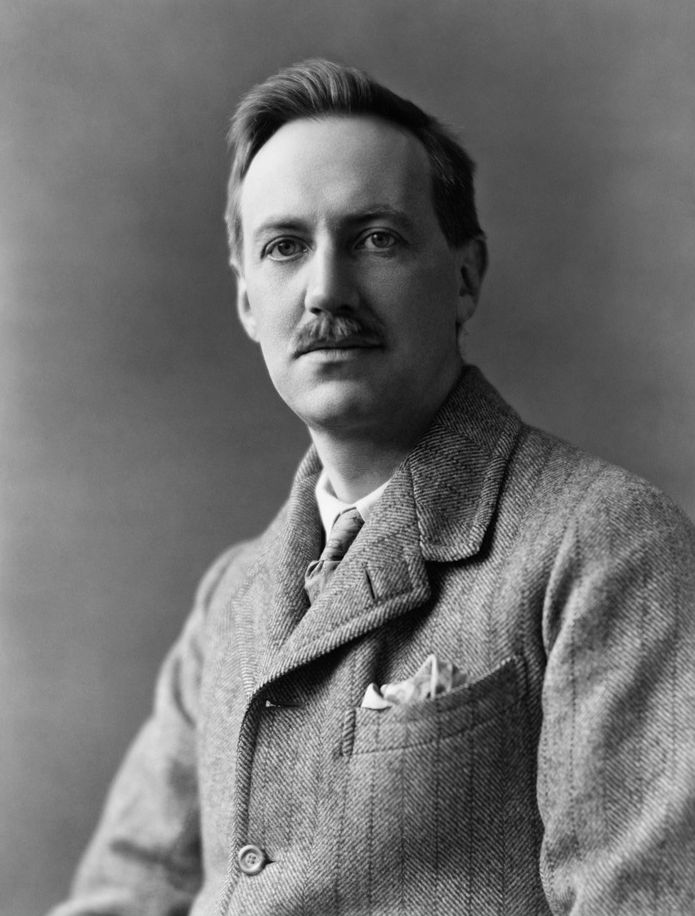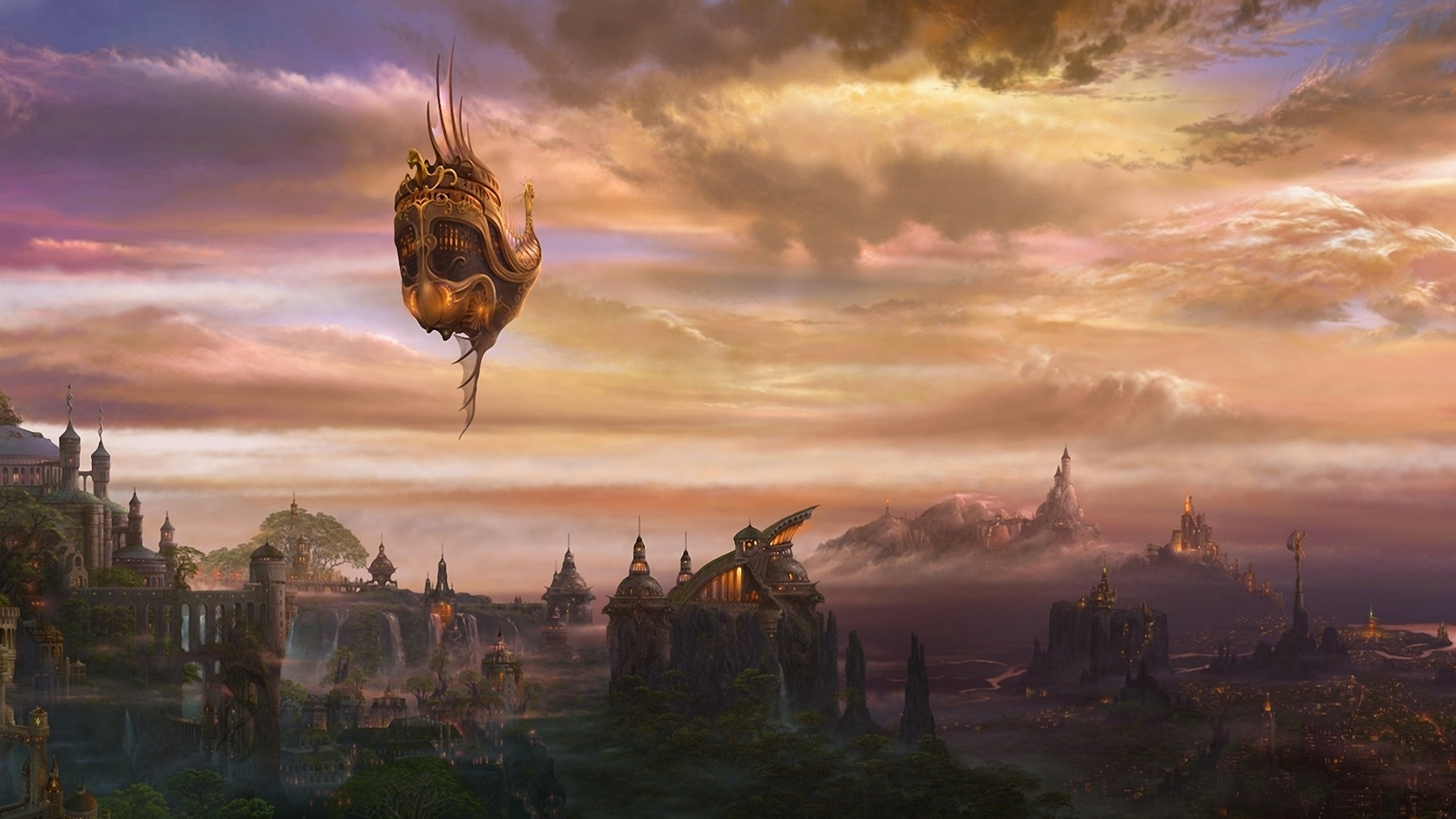Editor’s note: The following is extracted from Tales of Wonder, by Lord Dunsany (published 1916).
He who is Sultan so remote to the East that his dominions were deemed fabulous in Babylon, whose name is a by-word for distance today in the streets of Bagdad, whose capital bearded travellers invoke by name in the gate at evening to gather hearers to their tales when the smoke of tobacco arises, dice rattle and taverns shine; even he in that very city made mandate, and said: “Let there be brought hither all my learned men that they may come before me and rejoice my heart with learning.”
Men ran and clarions sounded, and it was so that there came before the Sultan all of his learned men. And many were found wanting. But of those that were able to say acceptable things, ever after to be named The Fortunate, one said that to the South of the Earth lay a Land — said Land was crowned with lotus — where it was summer in our winter days and where it was winter in summer.
And when the Sultan of those most distant lands knew that the Creator of All had contrived a device so vastly to his delight his merriment knew no bounds. On a sudden he spake and said, and this was the gist of his saying, that upon that line of boundary or limit that divided the North from the South a palace be made, where in the Northern courts should summer be, while in the South was winter; so should he move from court to court according to his mood, and dally with the summer in the morning and spend the noon with snow. So the Sultan’s poets were sent for and bade to tell of that city, foreseeing its splendour far away to the South and in the future of time; and some were found fortunate. And of those that were found fortunate and were crowned with flowers none earned more easily the Sultan’s smile (on which long days depended) than he that foreseeing the city spake of it thus:
“In seven years and seven days, O Prop of Heaven, shall thy builders build it, thy palace that is neither North nor South, where neither summer nor winter is sole lord of the hours. White I see it, very vast, as a city, very fair, as a woman, Earth’s wonder, with many windows, with thy princesses peering out at twilight; yea, I behold the bliss of the gold balconies, and hear a rustling down long galleries and the doves’ coo upon its sculptured eaves. O Prop of Heaven, would that so fair a city were built by thine ancient sires, the children of the sun, that so might all men see it even today, and not the poets only, whose vision sees it so far away to the South and in the future of time.
“O King of the Years, it shall stand midmost on that line that divideth equally the North from the South and that parteth the seasons asunder as with a screen. On the Northern side when summer is in the North thy silken guards shall pace by dazzling walls while thy spearsmen clad in furs go round the South. But at the hour of noon in the midmost day of the year thy chamberlain shall go down from his high place and into the midmost court, and men with trumpets shall go down behind him, and he shall utter a great cry at noon, and the men with trumpets shall cause their trumpets to blare, and the spearsmen clad in furs shall march to the North and thy silken guard shall take their place in the South, and summer shall leave the North and go to the South, and all the swallows shall rise and follow after. And alone in thine inner courts shall no change be, for they shall lie narrowly along that line that parteth the seasons in sunder and divideth the North from the South, and thy long gardens shall lie under them.
“And in thy gardens shall spring always be, for spring lies ever at the marge of summer; and autumn also shall always tint thy gardens, for autumn always flares at winter’s edge, and those gardens shall lie apart between winter and summer. And there shall be orchards in thy garden, too, with all the burden of autumn on their boughs and all the blossom of spring.
“Yea, I behold this palace, for we see future things; I see its white wall shine in the huge glare of midsummer, and the lizards lying along it motionless in the sun, and men asleep in the noonday, and the butterflies floating by, and birds of radiant plumage chasing marvellous moths; far off the forest and great orchids glorying there, and iridescent insects dancing round in the light. I see the wall upon the other side; the snow has come upon the battlements, the icicles have fringed them like frozen beards, a wild wind blowing out of lonely places and crying to the cold fields as it blows has sent the snowdrifts higher than the buttresses; they that look out through windows on that side of thy palace see the wild geese flying low and all the birds of the winter, going by swift in packs beat low by the bitter wind, and the clouds above them are black, for it is midwinter there; while in thine other courts the fountains tinkle, falling on marble warmed by the fire of the summer sun.
“Such, O King of the Years, shall thy palace be, and its name shall be Erlathdronion, Earth’s Wonder; and thy wisdom shall bid thine architects build at once, that all may see what as yet the poets see only, and that prophecy be fulfilled.”
And when the poet ceased the Sultan spake, and said, as all men hearkened with bent heads:
“It will be unnecessary for my builders to build this palace, Erlathdronion, Earth’s Wonder, for in hearing thee we have drunk already its pleasures.”
And the poet went forth from the Presence and dreamed a new thing.











Well, that was lovely. Our literature is rooted in oral tradition and image weaving, like poetry, giving verbal shortcuts to our imagination, each one self crafted. Our modern day images, dreams and “traditions” are handed to us off the rack, all the same. We share product ads and TV shows that are exactly the same for each who watched. Those tinkling fountains, motionless lizards and dark mid winter skies described above briefly in a few words take each reader/listener on their own mental journey. Thank you so much for posting.
Yes, exactly. My image of the palace description,as well as the sultan himself was necessarily different from yours and everyone else who read the article. To see them depicted in painting or motion picture would limit what we imagine possible. I always caution people to read the book before watching a movie about the book so that their imagination doesn’t get stifled. As the sultan observed, it’s best to not build the palace. I think it would have been a letdown.